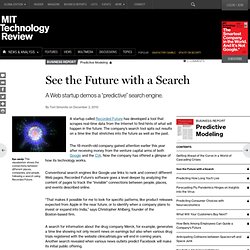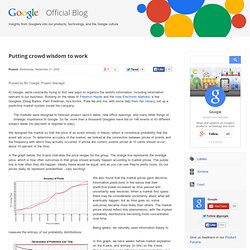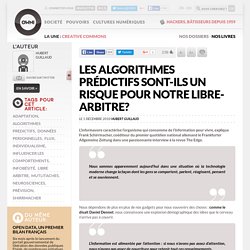

Technology Review: See the Future with a Search. A startup called Recorded Future has developed a tool that scrapes real-time data from the Internet to find hints of what will happen in the future.

The company’s search tool spits out results on a time line that stretches into the future as well as the past. The 18-month-old company gained attention earlier this year after receiving money from the venture capital arms of both Google and the CIA. Now the company has offered a glimpse of how its technology works. Conventional search engines like Google use links to rank and connect different Web pages. Recorded Future’s software goes a level deeper by analyzing the content of pages to track the “invisible” connections between people, places, and events described online. “That makes it possible for me to look for specific patterns, like product releases expected from Apple in the near future, or to identify when a company plans to invest or expand into India,” says Christopher Ahlberg, founder of the Boston-based firm.
Putting crowd wisdom to work. Posted by Bo Cowgill, Project Manager At Google, we're constantly trying to find new ways to organize the world's information, including information relevant to our business.

Building on the ideas of Friedrich Hayek and the Iowa Electronic Markets, a few Googlers (Doug Banks, Patri Friedman, Ilya Kirnos, Piaw Na and me, with some help from Hal Varian), set up a predictive market system inside the company. The markets were designed to forecast product launch dates, new office openings, and many other things of strategic importance to Google. So far, more than a thousand Googlers have bid on 146 events in 43 different subject areas (no payment is required to play). We designed the market so that the price of an event should, in theory, reflect a consensus probability that the event will occur.
In the graph below, the X-axis indicates the price ranges for the group. Being geeks, we naturally used information theory to measure the entropy of our probability distributions: Twarfing: Gathering Intelligence from Twitter Data. Les algorithmes pr?dictifs sont-ils un risque pour notre libre-arbitre? ? Article ? OWNI, Digital Journalism. L’informavore caractérise l’organisme qui consomme de l’information pour vivre, explique Frank Schirrmacher, coéditeur du premier quotidien national allemand le Frankfurter Allgemeine Zeitung dans une passionnante interview à la revue The Edge.

Nous sommes apparemment aujourd’hui dans une situation où la technologie moderne change la façon dont les gens se comportent, parlent, réagissent, pensent et se souviennent. Nous dépendons de plus en plus de nos gadgets pour nous souvenirs des choses : comme le disait Daniel Dennet, nous connaissons une explosion démographique des idées que le cerveau n’arrive pas à couvrir. L’information est alimentée par l’attention : si nous n’avons pas assez d’attention, nous n’avons pas assez de nourriture pour retenir tout ces renseignements. Or, à l’âge de l’explosion de l’information que faut-il retenir ? Que faut-il oublier ? La question est de savoir ce qu’il faut enseigner, ce qu’il faut apprendre et comment. Quelles informations retenir ? Introduction - Rationalité et sciences sociales - Jon Elster. Le désintéressementTraité critique de l’homme économique I Jon ElsterColl.

"Les livres du nouveau monde"Paris, Ed. Seuil, 2009. Zocalo Prediction Markets. Intrade Prediction Markets.